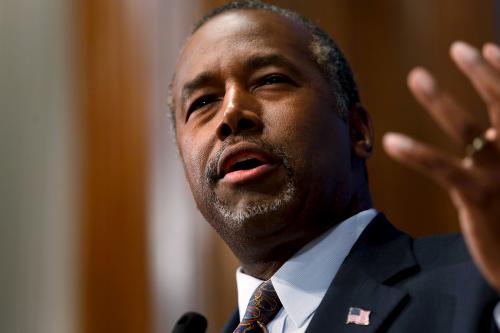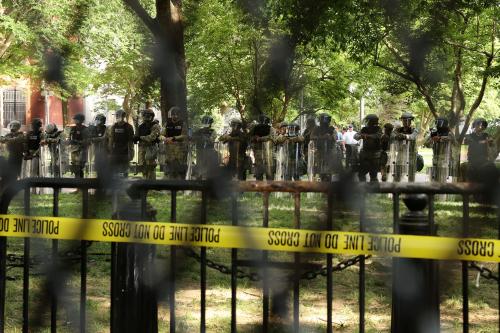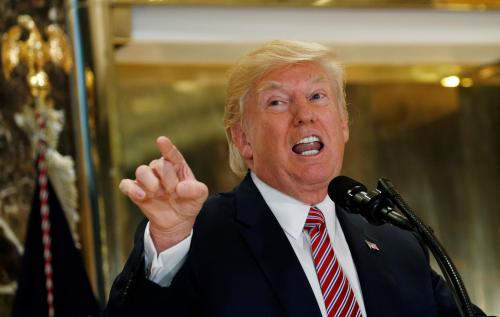One of the most important, unofficial roles of an American president is to comfort and help heal the nation when we face tragedy. It is a role no president enjoys serving in, but one that a pained nation expects and needs in order to deal with some ghastly harm
During America’s most recent tragedy, when a nervous nation watched a modern-day Bund rally end with an act of terror that killed a young woman, President Trump choked.
Whether it was President Reagan speaking to the nation after the Challenger explosion, President Clinton addressing Americans after the Columbine shooting, President Bush speaking from the Oval Office the evening of 9/11, or President Obama eulogizing classrooms of dead first graders from an auditorium in Newtown, Connecticut, all presidents step up to this difficult task.
Or at least, they used to.
Before this week, President Trump appeared capable of playing that role. After Congressman Scalise, members of the Capitol Police, and others were shot by a deranged, leftist gunman in June, Mr. Trump was quick to take appropriate (and expected) action: Consoling victims, honoring heroes, and asking for prayers for a legislator gravely wounded for simply being a Republican and an elected official.
However, during America’s most recent tragedy, when a nervous nation watched a modern-day Bund rally end with an act of terror that killed a young woman, President Trump choked. He didn’t steel the nation with a resolve to step up to hatred and evil. He did not wipe tears from his eyes and offer comfort. He did not offer advice to Americans about how to process an unspeakable display of hatred.
He didn’t do much.
Most presidents would have put politics aside and called out the actions of the worst of our society. They would not have needed staff to force them to sputter through a statement that lacked both heart and awareness. Other presidents would have joined elected officials from both parties, visited Charlottesville, honored those who died, and offered a vision of moral clarity to the nation. Instead, Mr. Trump condoned the perpetrators of that violence, embarrassed a nation with a series of meager responses, and grew increasingly petulant as criticism poured in. He went so far as to retweet a (since deleted) cartoon depicting a member of the mainstream media being run down by a vehicle—just days after a car was used to murder a young woman in Charlottesville.
President Trump showed his true colors when he delivered off-the-cuff remarks during an event on infrastructure. He could no longer deny what his soul demanded he do: publicly sympathize with Nazis and murderers and blame both sides—the other side being the people who stood up and said no to a group of White Nationalists chanting 1930s Nazi mottos like “Blood and Soil” or screaming from behind their torches, “Jews will not replace us.”
While equating counter-protesters, like Saturday’s young victim Heather Heyer, to David Duke, Richard Spencer, and their menagerie of angry white man-children, Mr. Trump brought to the Office of President of the United States a level of moral decay and tone-deaf cowardice that horrified elected officials of both parties, Americans of all stripes, and even his own staff.
The president’s actions were unlike those of any modern president on issues of race or violence. He comforted Nazis by reminding reporters that they had permits and showed fascists they were not the enemy by explaining “there are two sides to everything.”
Imagine a scenario in which President Bush explained to a nation that “9/11 terrorists did buy plane tickets.” Imagine President Obama explaining to reporters asking about ISIS that “there are two sides to every story.”
The president seems capable of harshly condemning violence and terror, as we have seen in the wake of yesterday’s terror attack in Barcelona. Yet, that swift condemnation apparently requires the perpetrator be a foreigner, a person of color and/or a Muslim—not a white supremacist wrapping himself in a swastika-emblazoned flag.
The presidential list of duties does not formally include “behave in a presidential manner” or “stand up for what is right and moral and fair.” Every American simply expects it of the person chosen to occupy the Oval Office.
Yet, no American should be surprised that President Trump failed to step up and speak in a manner worthy of his office. He incited violence during his campaign rallies and offered to pay legal bills of his supporters who were arrested. He has labeled entire groups of people as “murderers and rapists.” He once boasted that people would still support him if he shot someone on 5th Avenue.
The president’s true views on race and his incapacity to deal with certain issues popped up again this week when the president indicated he was “seriously considering” pardoning his friend and campaign supporter, Sheriff Joe Arpaio. The sheriff was recently convicted of federal contempt of court for defying a federal court order to stop engaging in unconstitutional racial profiling.
In the wake of a white power rally that ended with someone using an increasingly common tactic of ISIS sympathizers—a vehicle as a weapon of mass destruction—Donald Trump considered pardoning a man who was illegally targeting people of color for arrest—a man who once called his detainment camp for immigrants his “concentration camp.” For a man who boasts of wanting to bring back the rule of law, Mr. Trump seems only to have contempt for it.
Pardoning Arpaio would go further than bad political optics. It would also break down the legitimacy of the separation of powers. Such a pardon would show that the president is comfortable with local law enforcement defying the orders of federal courts, especially if it means targeting groups of people for whom he and his white nationalist and Nazi compatriots also have contempt.
What happened in Charlottesville last week was tragic. The president’s response to that tragedy was appalling. Considering a pardon of Joe Arpaio is mind numbing. But each fits into a broader policy equation for the president. Since the first day of his presidential campaign, Mr. Trump has committed himself to a worldview that pits him and people who think like him against other “bad” groups. It should come as no surprise that the man who labeled Mexicans “murderers and rapists” would find a common bond with a group of white nationalists chanting “One people, one nation, end immigration.” And that after aiding and abetting those advocating for a race war, he would consider helping one of its most visible generals, Joe Arpaio, with a get-out-of-jail-free card.
Over the past two weeks we have seen the power of a president to reshape the American conversation. Unfortunately, in this case, the president has handed a bullhorn to the lowest among us.
The Brookings Institution is committed to quality, independence, and impact.
We are supported by a diverse array of funders. In line with our values and policies, each Brookings publication represents the sole views of its author(s).








Commentary
Donald Trump: Condoner-in-chief
August 18, 2017